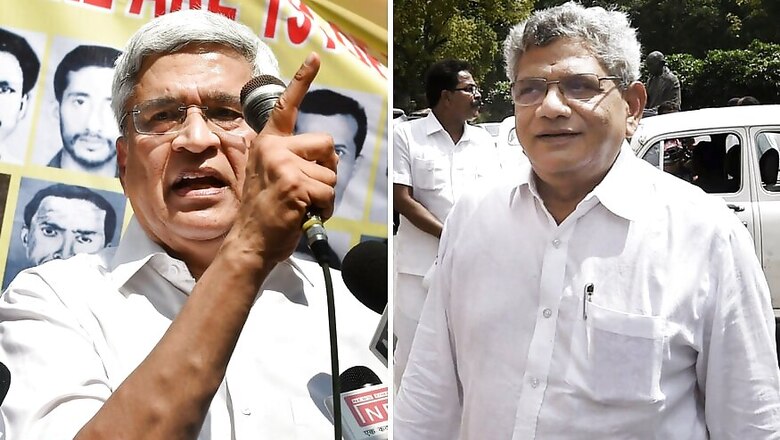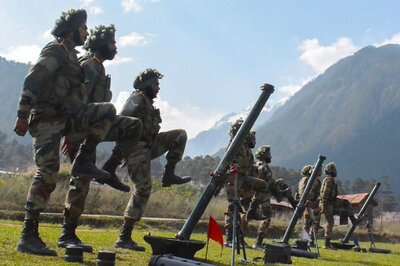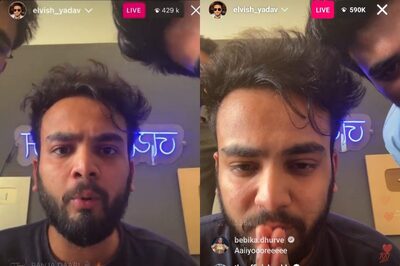
views
Amid serious differences over its electoral approach towards the Congress party, a crucial three-day meeting of the CPM central committee is underway in Kolkata to finalise a draft political resolution for approval of party’s next Congress in Hyderabad between April 17 and 19.
As of now, the CPM is vertically split over the “means” to achieve its primary objective of dislodging BJP-led government at the Centre in 2019, partly due to extreme ideological positioning, Kerala politics, where the Congress is CPM’s principal political opponent and ego tussles.
The rigidity of the factions is such that a Central Committee meeting in October, a Politburo meet in December and a series of subsequent Politburo meetings till January 10 failed to resolve the differences. In the last Central Committee meeting attended by 63 of the 72 members, 31 backed general secretary Sitararam Yechury’s line, while 32 endorsed former general secretary Prakash Karat’s position. Yechury camp hopes to edge out the hardliners in the Kolkata conference.
While the group led by pragmatist Yechury is pitching for a broad anti-communal platform in cooperation with secular forces (that include the Congress and regional parties), the faction-led by dogmatist Karat, does not want any truck with the Congress. Karat’s draft agreed with Yechury’s formulation of defeating the BJP, but with a caveat — “without entering into any understanding or alliance with the Congress party”.
As a result of the divergence, two separate political draft resolutions are being placed before the Central Committee. And if the three-day session failed to end the impasse and adopt a single draft, the Congress will be faced with an unprecedented situation of facing two drafts for consideration.
The question is how practical is it to take on an entrenched saffron party without having the principal opposition party on board? Politics in India is no longer as usual after a “Modi-fied” BJP wrested power from the Congress four years ago.
Since 2014, the CPM held several meetings of its high-powered Politburo and Central Committees to resolve this tangle but in vain as ideological puritans resisted any attempt to water down party’s opposition to neo-liberal economic policies pursued by the Congress and other secular parties.
Yechury’s draft calls for the formation of a Left Democratic Front as a political alternative encompassing all secular forces in the umbrella coalition. To buy peace with the dissenters, he agreed to exclude the ruling class parties (read the Congress) from the proposed electoral front keeping the option of collaboration, but still, Karat faction insisted of no truck with Congress policy.
The last time the Communists faced two separate drafts was in 1964 that led to the split of the undivided Communist Party of India, giving birth to the CPM and the CPI. The factions toeing the Moscow line and favouring joining hands with Nehru-led Congress was considered revisionists and “right wing” (they later formed the CPI), while ideological puritans supporting China christened themselves as the CPM-Marxists. Incidentally, the 1964 Congress was also held in Kolkata.
Yechury insists that as India is a country of unparalleled diversities and the “alternative policy framework” should not and cannot remain exclusively only an economic policy framework, Karat is adamant on hair-splitting saying that while the CPM will not have any understanding with Congress at the national level, the party can collaborate with regional parties. In states where the Congress and BJP are in a direct fight, it can campaign for the defeat of BJP.
This, apparently, is a contradictory stand because if you work for the defeat of BJP, say in b-polar states like Gujarat, MP, UP, Rajasthan etc, are you backing the Congress indirectly? Then why this convoluted approach? Even as Karat is staunchly opposed to bourgeois Congress, his party has no problem in aligning with neo-liberal parties such as the Sharad Pawar-led NCP and the JD(S) in Kerala.
Is this the time for hair-splitting? Ask those concerned over the new, unconventional politics of Prime Minister Narendra Modi and CPM’s sinking bases in West Bengal and Tripura where BJP is making rapid inroads.
The overuse of the outdated political-tactical line, a relic of 1978, has retarded party’s organisational growth. Election results of last 10 years are testimony to this.
Some analysts even suspect that the Kerala faction may be indirectly trying to buy peace with the BJP as the CBI has challenged the acquittal of Kerala Chief Minister Pinarayi Vijayan in the SNC-Lavlin pay-off case by the High Court. “The CBI kept silent for about a year over Lavlin case and coinciding with crucial meetings to fine-tune party’s political strategy, the investigating agency becomes proactive at the behest of the Centre,” alleged a party insider who did not want to be quoted.
Incidentally, Karat’s observation in 2016 that BJP is authoritarian and Right-wing, but not a fascist force had drawn flak from many of his own colleagues. He, however, subsequently clarified his stand which was lost in semantics, but it rekindled the debate whether Modi regime is fascist or not.
Speaking at the then Central Committee meeting, Yechury asserted that the BJP government is not fascist in the classical sense but acts as the political arm of the RSS which has a “fascistic agenda”, giving rise to speculation that Karat overstepped party line or erred in his assessment of the Modi regime. Former Kerala chief minister VS Achuthanandan, who also spoke at the Central Committee meet, had accused Karat of diluting the “fight against Modi regime” by his avoidable comments.
In an earlier editorial in party mouthpiece Peoples’ Democracy, Karat said: “Most of the regional parties have embraced the neo-liberal policies and are prone to make opportunistic alliances.” The Congress, the editorial said, “is primarily responsible for the imposition of neo-liberal policies and it stands discredited due to years of misrule and corruption.”
Even as the Marxists insist on following “socialist economy”, their ideological brother Communist Party of China has tweaked its policy to suit the contemporary world situation. China is raking in millions of dollars through its economic cooperation with the US. How can Karat faction fight the BJP behemoth keeping neo-liberal parties out and not differentiating between class and communal enemies?
(The author is a senior journalist and political commentator. Views are personal.)




















Comments
0 comment